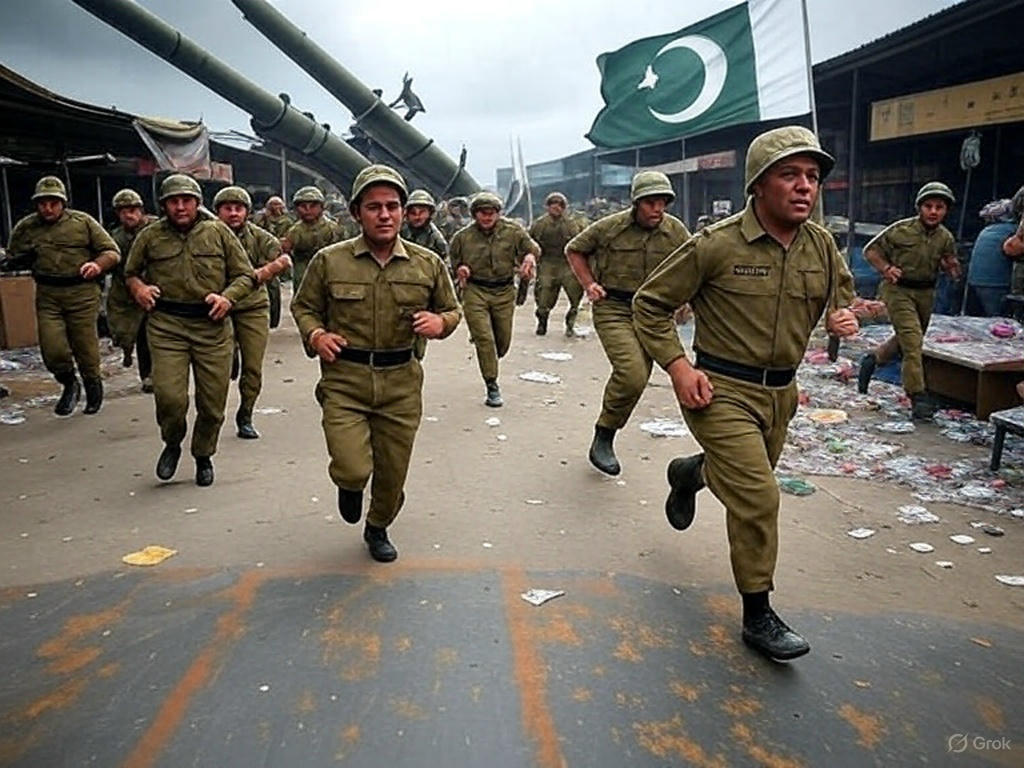
Pakistan’s stock markets experienced a sharp decline on Thursday, May 8, 2025, following claims of Indian drone incursions over major cities, while Indian markets showed initial resilience before turning negative amid escalating geopolitical tensions. The developments, coupled with India’s reported neutralization of a Pakistani air defence system in Lahore, have heightened uncertainty, rattling investors on both sides of the border.
KSE-100 Index Crashes Over 6%
The Karachi Stock Exchange’s benchmark KSE-100 index plunged by more than 6%, dropping to 103,060 points, as panic gripped investors. Trading was temporarily halted due to the steep fall, which was triggered by Pakistan’s claims that Indian drones had entered its airspace over Karachi and Lahore, the country’s largest cities. Fatima Bucha of AKD Securities noted that while the trading floor had calmed slightly after resuming, the situation remained volatile. “Investors are panicking due to the geopolitical situation. No one is sure what will happen next or how Pakistan will respond to India’s actions,” she said.
Pakistani military spokesperson Maj Gen Ahmed Sharif Chaudhry claimed that 12 Indian drones, allegedly Israeli-made Harop models, were shot down across multiple locations, with debris being recovered. Chaudhry warned that India’s “naked aggression” would come at a steep cost, further fueling market uncertainty. The KSE-100’s decline follows a broader downward trend, with the index losing nearly 10,000 points since the Pahalgam terror attack on April 22, 2025, which killed 26 people.
India Neutralizes Lahore Air Defence System
India’s Ministry of Defence confirmed that its armed forces not only thwarted Pakistani attempts to target military installations in Northern and Western India but also neutralized a Pakistani air defence system in Lahore. “On Thursday morning, Indian armed forces targeted air defence radars and systems at several locations in Pakistan. An air defence system in Lahore has been reliably neutralized,” the ministry stated, emphasizing that India’s response matched Pakistan’s actions in intensity and domain.
The strikes were part of India’s ongoing Operation Sindoor, launched in retaliation for the Pahalgam attack. The operation, which targeted nine terror camps in Pakistan and Pakistan-Occupied Kashmir (PoK) on May 7, has been described as “focused, measured, and non-escalatory” by Indian officials, with no Pakistani military infrastructure directly hit. However, Pakistan’s allegations of Indian drone attacks in Karachi, Lahore, and other cities have escalated tensions, with both nations accusing each other of aggression.
Indian Markets Show Resilience Before Slipping
In contrast to Pakistan’s market turmoil, Indian stock indices initially held steady despite the volatile geopolitical climate. The BSE Sensex climbed 181.21 points to 80,927.99, and the NSE Nifty rose 32.85 points to 24,447.25 in early trading. However, as news of cross-border escalations spread, both indices turned negative, with the Sensex dropping to 80,624 and the Nifty to 24,335 by late afternoon. The Indian rupee also weakened, slipping over 1% against the US dollar, marking its steepest decline in over three years.
Analysts attribute India’s relative market stability to strong economic fundamentals and investor confidence. “The non-escalatory nature of Operation Sindoor and its targeted focus helped maintain investor trust,” said V.K. Vijayakumar, Chief Investment Strategist at Geojit Investments. However, uncertainties remain, with market volatility hinging on Pakistan’s response and global economic factors.
Operation Sindoor and Political Unity
The escalating tensions stem from India’s Operation Sindoor, a series of precision strikes on terror infrastructure in Pakistan and PoK, launched in response to the April 22 Pahalgam terror attack. The attack, which killed 25 tourists and one local guide, was attributed to the Resistance Front (TRF), a proxy of Lashkar-e-Taiba, by Indian officials. On Thursday, the Indian government briefed an all-party meeting on the operation’s progress, chaired by Defence Minister Rajnath Singh. Key government figures, including Home Minister Amit Shah, External Affairs Minister S Jaishankar, BJP president J P Nadda, and Finance Minister Nirmala Sitharaman, attended, alongside opposition leaders like Congress president Mallikarjun Kharge, Rahul Gandhi, Trinamool Congress’ Sudip Bandyopadhyay, and DMK’s T R Baalu.
Singh informed the meeting that Operation Sindoor had eliminated at least 100 terrorists, though specific details were withheld due to the operation’s ongoing and sensitive nature. The opposition expressed unanimous support for the armed forces, with Kharge emphasizing national unity in the face of crisis. “We stand with the government in this hour,” he said, though he raised concerns about Prime Minister Narendra Modi’s absence from the meeting.
Broader Implications and Market Outlook
The sharp decline in Pakistan’s stock market reflects its economic vulnerabilities, exacerbated by India’s economic measures, such as the suspension of the Indus Waters Treaty and a ban on Pakistani imports. In contrast, India’s markets have demonstrated resilience, supported by strong foreign institutional investor inflows and minimal trade ties with Pakistan, which accounts for less than 0.5% of India’s exports. However, analysts warn that prolonged tensions could increase India’s defense spending, potentially straining fiscal resources.
For Pakistan, the market crash underscores deeper economic challenges, with investors rattled by the prospect of further retaliation. “Markets now hinge on Pakistan’s next move and global reactions,” said Prashanth Tapse, Senior VP at Mehta Equities. The closure of major Pakistani airports, including Karachi and Lahore, and disruptions in air travel across northern India have added to the sense of crisis.
Conclusion
The Pakistani stock market’s 6% plunge on May 8, 2025, following claims of Indian drone incursions and the neutralization of a Lahore air defence system, highlights the fragility of investor confidence amid rising India-Pakistan tensions. While Indian markets showed initial strength before slipping, the broader economic and geopolitical fallout remains uncertain. Operation Sindoor, aimed at dismantling terror infrastructure, has garnered political unity in India, but the risk of escalation looms large. As both nations navigate this volatile period, investors and policymakers alike will be closely watching for signs of de-escalation or further conflict.




